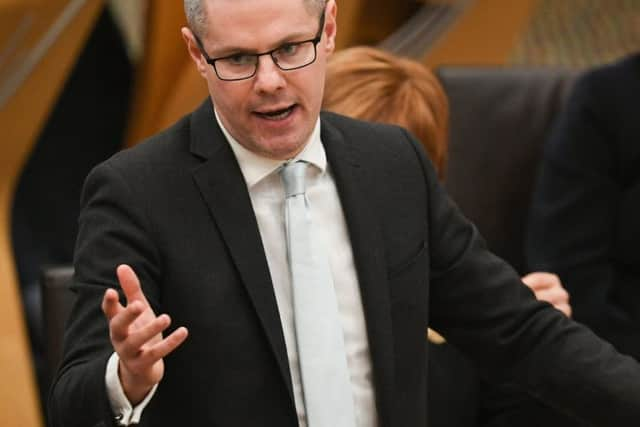Slow economic growth to hit Scottish tax intake by £2.1bn
This article contains affiliate links. We may earn a small commission on items purchased through this article, but that does not affect our editorial judgement.
Disappointing growth forecasts predicted by the Scottish Fiscal Commission (SFC) have seen a downwards revision of the income tax revenue, which will be collected in Scotland.
Forecasts made by the Scottish Fiscal Commission (SFC) showed lower than expected growth with GDP reaching just 0.7 per cent next year and only rising to 1.1 per cent by 2022.


Advertisement
Hide AdAdvertisement
Hide AdThe SFC warned that growth would be “subdued” and well below the two per cent experienced before the financial crisis. Scotland’s GDP is also expected to lag behind the rest of the UK.
The SFC report “Scotland’s Economic and Fiscal Forecasts December 2017”, published alongside Derek Mackay’s budget, warns: “The outlook for income tax is driven by the outlook for earnings and employment. Slow growth in the economy means slow growth in income tax revenues. As a result, the Commission is forecasting significantly lower revenue from income tax than previously forecast by the Scottish Government.”
When the SFC’s forecasts are compared with official Scottish Government projections made in February this year Scotland is now expected to raise £2.1 billion less.


Next year alone (2018/19), the lost revenue due to lower growth is expected to be £205 million compared to projections earlier this year.
That figure arises from the difference between February’s forecast of £12,320 million to £12,115 million this week.
A similar effect is predicted for 2019/20 when February’s forecast has been revised down from £12,943 million to £12,582 million – a difference of £361 million.
In 2020/21 the forecasts have been revised down from £13,681 million to £13,084 million – a reduction of £597 million.
While 2021/22 has seen the forecast revised down from £14,595 million to £13,662 million – a reduction in tax take of £933 million.
Advertisement
Hide AdAdvertisement
Hide AdWhen the overall difference between February’s forecasts and this week’s SFC revised estimates were calculated the total came to almost a £2.1 billion loss of income tax receipts.
Shadow Finance Secretary Murdo Fraser made the point that the reduction in tax take for each of the next four years was more than the £164 million that ministers expect to raise from their reformed income tax system.
Mr Mackay’s budget announced two new tax bands that would deliver a small tax cut for the lower paid, but would see all those earning more than £26,000 pay more income tax than their counterparts in the rest of the UK.
Mr Fraser MSP said: “Thanks to the coming Sturgeon slowdown, the Scottish Government is projected to raise £2 billion less than expected over the remainder of this Parliament. That’s £2 billion less going to schools and hospitals because of the failure to match levels of growth we are seeing elsewhere in the UK. “The SNP’s answer is to introduce a new Nat Tax - but these figures show if we had higher growth, there would be no need to do so. “The SNP’s Nat tax isn’t just a broken promise, it’s bad economics. Hanging a sign at the border saying higher taxes will drive away jobs and leave Scotland further behind other parts of the UK. “Nicola Sturgeon broke her promise on tax this week. She said she wouldn’t increase taxes on basic rate taxpayers, but that’s exactly what she’s done. “It is time she apologised, and instead focussed her government on delivering the growth we need to support our vital public services.”
A Scottish Government spokesperson said: “There is no black hole. The independent Scottish Fiscal Commission – who provide these figures for the budget – clearly state that revenues rise year-on-year.
“Under the Fiscal Framework, all forecasts of the Income Tax revenues are founded on revenues in 2016-17, the year before devolution of full Scottish income tax powers.
“The SFC forecast that growth in Income Tax revenues will outstrip growth in the rest of the UK and provide extra support for public services. Far from their being a black hole, therefore, Scotland is on course to outperform the rest of the UK.”
DOWNLOAD THE SCOTSMAN APP ON ITUNES OR GOOGLE PLAY
